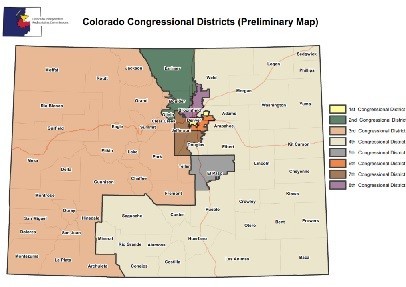Widgetized Section
Go to Admin » Appearance » Widgets » and move Gabfire Widget: Social into that MastheadOverlay zone
All of Eagle County would be in Boebert’s CD3 under proposed redistricting

The Colorado Congressional Redistricting Commission on Wednesday issued the following press release on preliminary maps presented by nonpartisan commission staff adding an eighth district (per 2020 U.S. Census population growth) and redrawing the rest of the districts.
In the preliminary maps presented Wednesday and far from being finalized, Eagle County would no longer be split between the 3rd and 2nd Congressional Districts and would instead be entirely within CD3, which is currently represented by far-right gun advocate Republican U.S. Rep. Lauren Boebert. The eastern third of Eagle County, including Vail, would be added to CD3, as would all of neighboring Summit County, which is represented by liberal Lafayette Democratic U.S. Rep. Joe Neguse in CD2.
Here’s the press release:
DENVER — Preliminary Colorado Congressional maps were presented to the Congressional Redistricting Commission this afternoon. Maps can be viewed or downloaded at https://redistricting.colorado.gov/content/2021-redistricting-maps
These maps, compiled by nonpartisan commission staff, are a starting point as the commissions gather public input over the course of the next several months. Redistricting commissions staff and the Colorado State Demography Office worked together to create the preliminary data set, which was approved by the commissions last month. These maps will be presented and open to discussion and feedback in a series of public hearings across Colorado. The preliminary state senate and state house maps will be presented to the Legislative Redistricting Commission on Tuesday, June 29, 2021.
The preliminary data set is also loaded into the Redistricting Online Portal, a new tool available to the public today. This tool allows anyone to draw and review Colorado redistricting maps and submit them to the commissions for consideration.
As stated in the Colorado Constitution, the new Congressional districts must:
- Have equal population, justifying each variance, no matter how small, as required by the U.S. Constitution;
- Be composed of contiguous geographic areas;
- Comply with the federal “Voting Rights Act of 1965,” as amended;
- Preserve whole communities of interest and whole political subdivisions, such as counties, cities, and towns;
- Be as compact as is reasonably possible; and
- Thereafter, maximize the number of politically competitive districts.
Districts cannot be drawn for the purpose of:
- Protecting incumbents or declared candidates of the U.S. House of Representatives or any political party; or
- Denying or abridging the right of any citizen to vote on account of that person’s race or membership in a language minority group, including diluting the impact of that racial or language minority group’s electoral influence.
After the roadshow of public hearings concludes, and once Colorado receives the census redistricting data, after Aug. 16, 2021, staff will refine the maps and present revisions to the commissions for consideration and approval. Upon adopting a final map, the commissions will submit maps to the Colorado Supreme Court for review and approval.
Written public comments will remain open and available through the public hearing process and the consideration of final maps. The commissions will also conduct a second round of public hearings, one in each congressional district, after maps have been completed using the final census data.
Enacted in 2018, the Colorado Constitution requires the establishment of the Colorado Independent Congressional Redistricting Commission and the Colorado Independent Legislative Redistricting Commission (commissions) and requires the commissions to redraw U.S. House of Representatives and state legislative districts following each federal census occurring every 10 years.
The two commissions are composed of 12 members: four members who are registered with the Republican Party, four members who are registered with the Democratic Party, and four members who are not registered with any political party. The commissions are assisted by nonpartisan staff who are employed by nonpartisan service agencies of the Colorado General Assembly.


